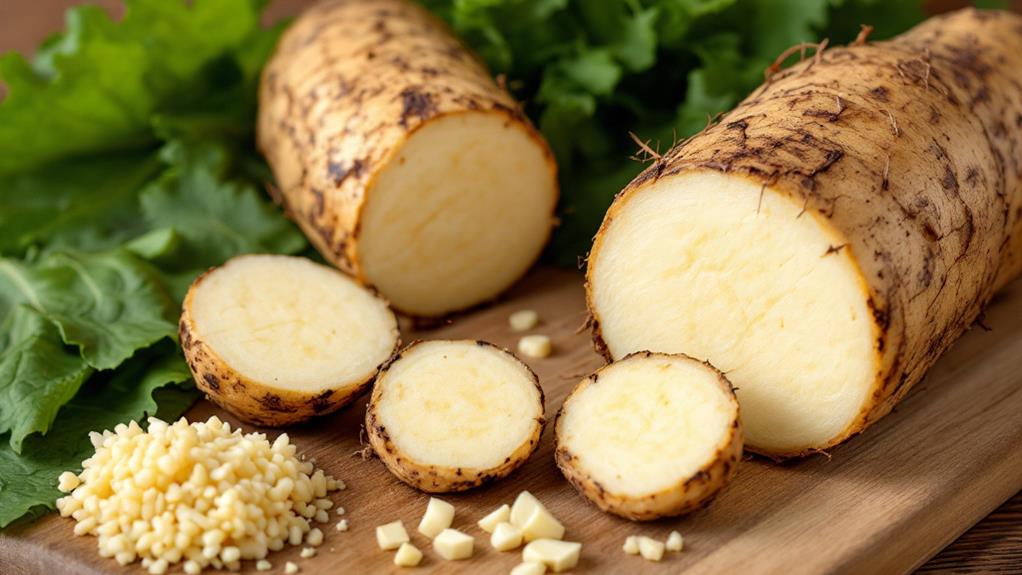The Many Health Benefits of Pineapples You Need to Know

You'll find pineapples are more than just a tropical delight; they're a nutritional powerhouse. Packed with vitamin C, manganese, and fiber, they support your digestion and immune system. Bromelain, a natural enzyme, aids digestion and reduces inflammation. Plus, the rich antioxidants fight free radicals, helping protect your body from chronic diseases. With only 75 calories per cup, they fit seamlessly into weight management plans. For ideal freshness, store whole pineapples at room temperature or refrigerate the cut ones. Regardless of enhancing your diet or improving your meals, dig into the juicy benefits pineapples offer. There's even more to uncover!
Nutritional Powerhouse
Bursting with important nutrients, pineapple earns its title as a nutritional powerhouse. You'll find that this tropical fruit is low in calories, packing about 75 calories per cup, making it an excellent, nutrient-dense choice for maintaining a balanced diet. One of the most impressive health benefits is its vitamin C content. Just a single cup provides over 88% of your daily needs, necessary for enhancing your immune system and promoting healthy skin.
Pineapple doesn't stop there. It's also exceptionally high in manganese, offering more than 100% of your daily requirement in one serving. This mineral supports bone formation and aids in metabolism, ensuring your body functions smoothly. Furthermore, the fruit contains nearly 10% of the daily fiber needs per cup, which is significant for digestive health, keeping things moving along and maintaining regularity.
Additionally, pineapples are rich in B vitamins like thiamin, niacin, and folate. These vitamins play an important role in energy metabolism and general nutrient absorption. By incorporating pineapple into your diet, you're supporting a robust immune system and benefiting from a myriad of necessary nutrients without the calorie overload.
Digestive Support
Release the digestive benefits of pineapples with their unique enzyme, bromelain, which aids in breaking down proteins efficiently. This insightful approach to digestion not only increases your digestive health but also improves your comprehensive well-being. Bromelain acts as a catalyst, promoting better nutrient absorption and supporting gut health. So, if you're looking to enhance your digestive system, pineapples are your go-to fruit.
Consider the following benefits of incorporating pineapples into your diet:
- Fiber Content: Pineapples are rich in fiber, which promotes regular bowel movements and helps prevent constipation.
- Reduced Bloating: With their natural enzymes, pineapples help alleviate bloating by breaking down tough foods more efficiently, offering relief from digestive discomfort.
- Nutrient Absorption: Bromelain improves the absorption of vital nutrients, ensuring your body gets the most out of the food you eat, thereby improving gut health.
- Prevention of Digestive Disorders: Regular consumption of pineapples may help ward off digestive disorders by maintaining a balanced and efficient digestive system.
Embrace these benefits and experience the positive impact on your digestion. Pineapples are not just a tasty treat; they're a powerful ally for your digestive health.
Anti-Inflammatory Benefits

Pineapples offer a natural way to combat inflammation, thanks to bromelain, the potent enzyme they contain. This enzyme is renowned for its anti-inflammatory benefits and can help alleviate symptoms related to conditions like sinusitis and sprains. By including pineapple in your diet, you may experience significant pain relief, especially if you suffer from joint pain or arthritis. Bromelain works wonders by reducing inflammation in your joints, making it easier to manage osteoarthritis pain.
The health benefits of pineapples don't stop there. The vitamin C in these tropical fruits also plays an essential role in lowering inflammation levels throughout your body. This not only supports recovery from injuries and infections but also aids in managing chronic inflammation. Such inflammation is often linked to diseases like rheumatoid arthritis, making pineapples a valuable supplement to your diet if you're seeking complementary pain relief and inflammation management.
Antioxidant Properties
While you might enjoy pineapples for their sweet and tangy flavor, it's their rich antioxidant properties that truly stand out. Pineapples are loaded with antioxidants like flavonoids and phenolic acids, which are vital for combating free radicals. These free radicals are notorious for causing oxidative stress, a condition linked to chronic diseases and cellular damage. By including pineapples in your diet, you're not just savoring a delicious fruit, but also embracing numerous health benefits.
Here's why the antioxidant activity in pineapples is significant:
- Vitamin C Power: Pineapples are high in vitamin C, a powerful antioxidant that improves your immune system and promotes skin health.
- Reduced Risk of Chronic Diseases: Eating pineapples regularly can help reduce the risk of oxidative stress-related conditions, such as cardiovascular disease and certain types of cancer.
- Cellular Health Support: The antioxidants in pineapples enhance cellular health and longevity, making them a valuable part of a balanced diet.
- Improved Body Defense: Studies suggest that pineapples can elevate your body's defense mechanisms, aiding in disease prevention and improving health outcomes.
Embrace the antioxidant magic of pineapples for a healthier you!
Weight Management Aid

Beyond their antioxidant benefits, consider pineapples a smart choice for weight management. This nutritious fruit is low in calories, with just about 75 calories per cup, making it a satisfying snack that won't derail your weight-conscious diet. Its high fiber content, providing nearly 10% of your daily fiber needs per cup, plays an essential role in promoting satiety and helping regulate your appetite, so you feel fuller longer.
Pineapples also contain bromelain, an enzyme that may assist in fat metabolism. While more human studies are needed to fully understand this potential benefit, incorporating pineapples into your meals can improve flavor without adding significant calories. This makes them a versatile ingredient for those mindful of their caloric intake.
Including plenty of fruits and vegetables in your diet, like pineapples, is associated with a lower risk of obesity and related chronic diseases. By integrating this delicious fruit into your meals, you can support your comprehensive weight management efforts and reduce your obesity risk. Regardless of being enjoyed on their own or as part of a flavorful dish, pineapples offer a tasty and nutritious way to aid your weight management expedition.
Selecting and Storing Pineapples
Selecting the perfect pineapple involves looking for a sweet aroma and ensuring it feels heavy with no soft spots or bruises on the skin. A firm pineapple with lively green leaves is a great sign of ripeness and freshness. Once you have your pineapple, how you store it can considerably affect its quality and flavor. Here's a quick guide to help you with selecting and storing your pineapples:
- Whole Pineapples: Keep them at room temperature for 2-3 days. This allows them to reach ideal ripeness, enhancing their flavor.
- Cut Pineapples: Store the pieces in the refrigerator. This helps maintain their freshness for 5-7 days, ensuring you enjoy them at their best.
- Freezing: If you want to extend the shelf life, freeze the pineapple. This preserves its quality for up to 6 months, allowing you to enjoy its taste and nutritional benefits over time.
- Preparation: Cut off the top and bottom, remove the outer skin, and slice it into quarters for easy serving.




